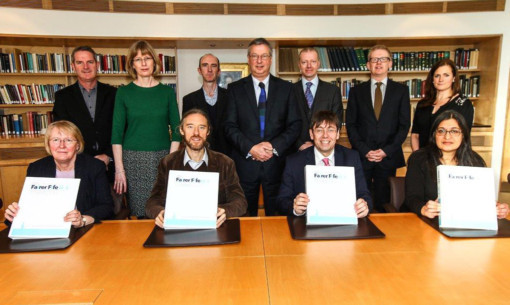An independent commission has outlined a far-reaching vision aimed at ending poverty in Fife.
Forty recommendations have been included in the Fairer Fife Commission’s report. entitled ‘Fairness Matters’, which challenges Fife Council, public services, charities and businesses to work together towards a “significantly fairer Fife by 2030”.
The Commission was established by Fife Council in September last year to examine the root causes of poverty in local communities and examine how best to help the 75,000 people thought to be directly affected by poverty in Fife.
And, at the report’s launch, council leader David Ross described it as a “document of huge significance for Fife”.
Among the recommendations listed include a push on building more affordable housing, encouraging a million more hours of volunteering a year, creating a new apprenticeship for every £1 million of public expenditure in Fife, a call for free travel cards for low income families, and more support for people facing welfare benefit sanctions.
Mr Ross described the number of people affected by poverty in Fife as “completely unacceptable in the 21st century”, adding that the impact, the cost and the loss of potential through poverty affects us all.
He explained: “We set up this independent Commission to bring together expertise and knowledge from across Scotland, to help us tackle this blight on our society, and consider how the council and its partners can make a real difference to people’s lives.
“This report is the result of a lot of hard work and thought and my thanks and appreciation go out to all the Commissioners who gave up their valuable time to focus on this project over the last year.
“Our pledge now is that the recommendations made here will shape the future direction of public services in Fife and will have a positive impact on people who need it most.
“This is a real milestone in the fight against poverty in our communities.
“It’s reassuring to receive confirmation from experts in the field that Fife is doing some great work but there is much more to be done.
“We are now going to build on that to develop and implement further practical action to reduce poverty in our communities.”
The Commission met regularly over the course of the year focussing on issues including financial capability, welfare advice, transport links, employability skills, childcare provision, early years services, educational attainment, health inequalities, housing and homelessness and addressing stigma.
They heard evidence from looked after children, users of foodbanks, people suffering the effects of sanctions, and others whose lives are affected by poverty.
Other recommendations made by the Commission include the establishment of a Knowledge Hub to become a centre of excellence in translating data on fairness in Fife into practical action; strengthening partnerships with the Department for Work and Pensions to improve the local welfare system and create trust between those looking for work and job centres; making more use of participatory budgeting in communities to guide spending; and placing more emphasis on cutting the attainment gap by working with all Fife schools individually.
There has also been a pledge to increase the number of people who are members of credit unions to 30,000 by 2030, and a commitment to setting up a pilot project to help those suffering from stress and anxiety as a result of the circumstances particularly people who are living alone.
The report’s launch was hosted by the Cottage Family Centre in Kirkcaldy, which does incredible work to help the most vulnerable on a daily basis.
Centre manager Pauline Buchan described the report as an “important step” for all organisations in Fife who are working to help people affected by poverty and added: “Our communities are strong and do a lot to help each other but they desperately need more support and investment to get through these hard times.”
